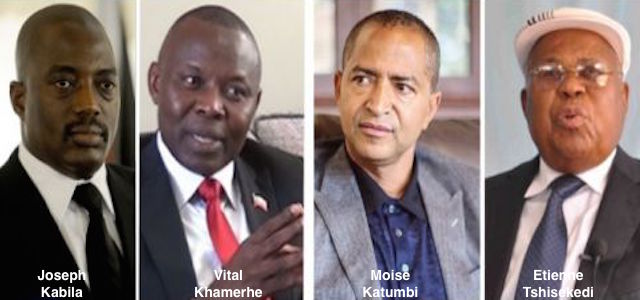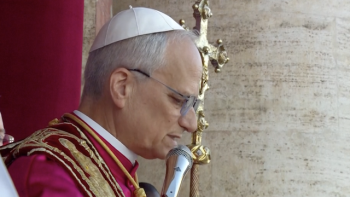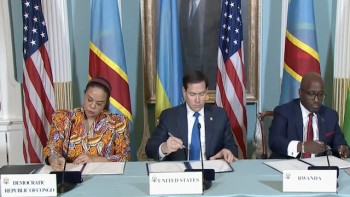As predicted in our in September 2016 and October 2016 articles (see Political Dialogue Opens in DRC: Vital Kamerhe, the Next Prime Minister? and Political Dialogue in DRC: Vital Kamerhe To Become Next Prime Minister, Sources in Kinshasa Say) it has become now clearer that Vital Kamerhe is set to become the next Prime Minister of the Democratic Republic of the Congo (DRC).
According to sources in Kinshasa, his imminent official appointment may happen next week. He has already the backing, not only of DRC President Joseph Kabila, but also the most influential heads of state of the region, including Jose Eduardo De Santos of Angola, Jacob Zuma of South Africa, and Sassoou Ngu'esso of the Republic of Congo. He has also secured the support from Southern African Development Community (SADC), International Conference on the Great Lakes Region (ICGLR), and the African Union (AU).
Outside Africa, major powers including the United States of America and the European Union appear not opposed to Vital Kamerhe's nomination. Hence, the challenge remains with the opposition parties that didn't participate to the negotiations. Those opposed to the recent political dialogue and hence to Vital Kamerhe's appointment the veteran UDPS opposition leader Etienne Tshisekedi and G7 leader, the magnate Moise Katumbi. Their parties and others have created an umbrella known as "The Rassemblement."
However, according to sources in Kinshasa, event the "Rassemblement" has started to disassemble. The sources have told AfroAmerica Network that Etienne Tshisekedi has been in secret negotiations with President Joseph Kabila and Vital Kamerhe on the prospects of having UDPS leaders enter the soon-to-be formed government. Etienne Tshisekedi appears to seek assurances that one of his sons, Felix or Christian Tshisekedi and UDPS Secretary General, Jean Marck Kabund-A-Kabund, will secure strategic cabinet positions.
An Ambitious Agenda
According to sources, Vital Kamerhe has started consultations across party lines to set up his government and its objectives. Among the top objectives are:
- Bring security to Eastern DRC;
- Organizing quick presidential and local elections;
- Crack down on corruption and kleptocracy.
To organize the elections, Vital Kamerhe has no other choice: he has bring peace and security in Eastern DRC and he will need help from the West. For that purpose, he has initiated contacts with Western governments and lobby groups in the West to ensure the much needed financial and logistical support, as soon as he takes the reigns.
Security in Eastern DRC: A Sine Qua Non For Success
Bringing security in Eastern DRC will be perhaps his most challenging test. He will need to the cooperation from neighboring states and Great Lakes leaders, especially from Rwanda's Paul Kagame, Uganda's Yoweri Museveni, and Burundi's Pierre Nkurunziza. In fact, Eastern DRC has been rocked by instability due to foreign opposition groups from Rwanda, Uganda, and Burundi. Three Rwandan armed opposition groups, the Rwandan Democratic Forces of Liberation (FDLR - FOCA), the Rally for Unity and Democracy (RUD - Urunana), and the Rally for the Rwandan People (RPR - Inkeragutabara) have established their bases in North-Kivu and South-Kivu for more than a decade. The Ugandan Allied Democratic Forces (ADF) insurgency has been systematically murdering Congolese civilians in North-Kivu province, apparently with the complicity of some Armed Forces of the Democratic Republic of Congo (FARDC) officers.
According to the sources in Kinshasa, to bring peace in Eastern DRC, Vital Kamerhe may appoint a Defense Minister from the region, with likely candidates being former Foreign Minister and member of DRC parliament in exile, Antipas Mbusa Nyamwisi or Déogratias Bugera and Moise Nyarugabo, who appear to be close to Rwandan leaders. Whoever will be appointed will need to move quickly to bring the Rwandan government and its armed opposition to the negotiation table, perhaps by resuming the still-born initiatives from Sant'Egidio Community with National Democratic Congress (NDC), an umbrella including RUD-Urunana and RPR-Inkeragutabara or SADC with FDLR-FOCA. At the same time, the new Defense will need to bring Ugandan government to cut a deal with ADF.
Cracking down on Kleptocrats
Cracking down on corruption has already received tailwind support from the USA government, at the least the US Congress. In a letter to the USA President Obama seen by AfroAmerica Network, members of US Congress House Committee on Foreign Affairs and House Subcommittee on Africa, Global Health, and International Organization has asked President Obama to impose sanctions on Joseph Kabila's closest allies: DRC Vice-Prime Minister and Minister of Interior Evariste Boshab and Intelligence Services (ANR) Head Kalev Mutond. They all also asked President Obama to direct the Department of Justice's Kleptocracy Asset Recovery Initiative (KARI) to investigate DRC officials and Joseph Kabila's closest aides, recover and return assets to the Congolese people.
Joseph Kabila's relatives were already included on the list being investigated by KARI, along with the following alleged kleptocrats from the African Great Lakes Region:
Jaynet Désirée Kabila Kyungu, twin sister of President Joseph Kabila, General Emmanuel Ndahiro, Private doctor and security advisor of Rwandan dictator Paul Kagame and former head of External Intelligence Services, Hatari Sekoko, the business partner of Paul Kagame's relatives, and Kenya’s deputy chief of justice Kalpana Rawal (see Kleptocrat Dictators: US Department of Justice Steps Up Investigation Efforts).

















